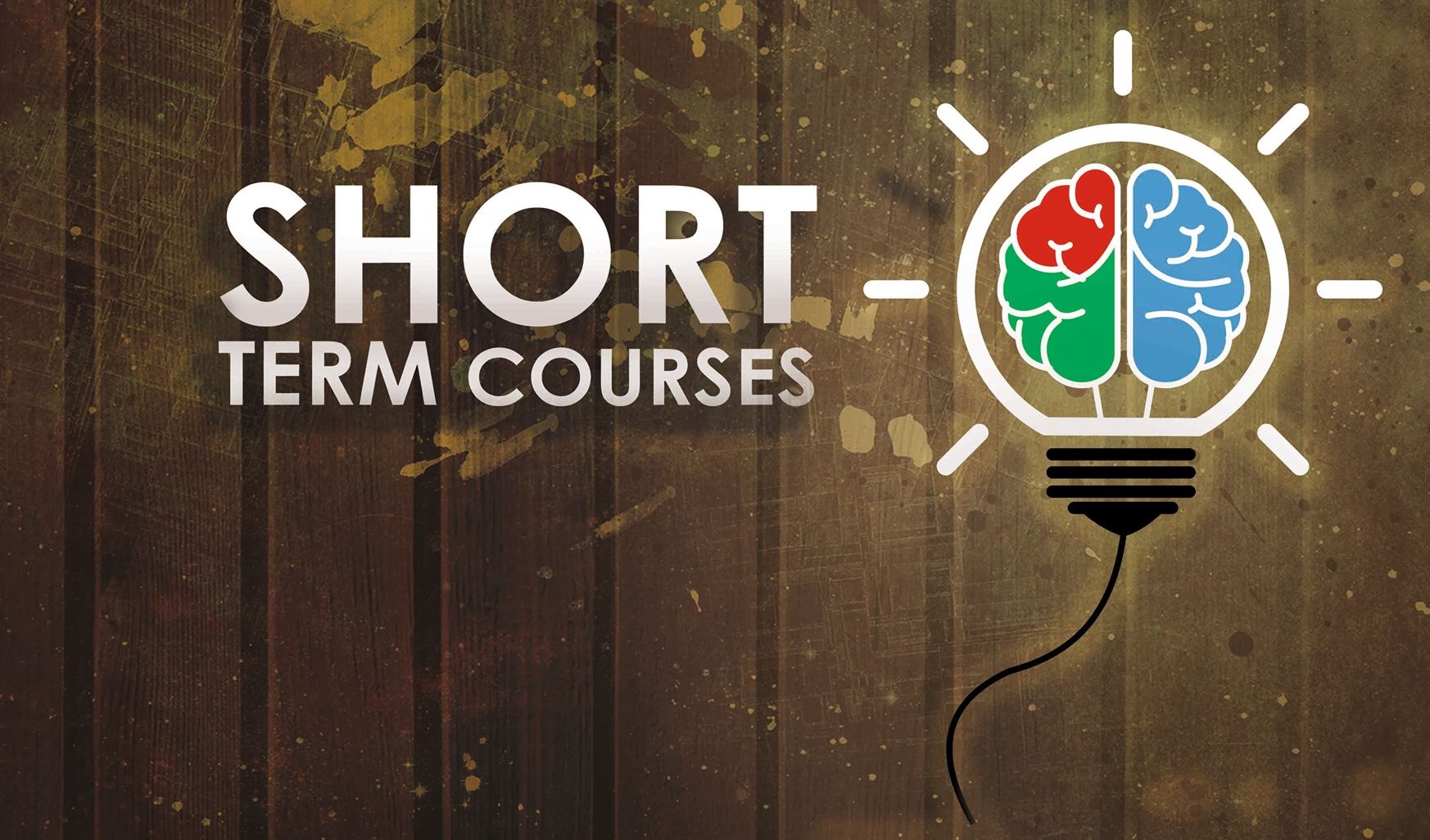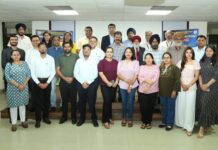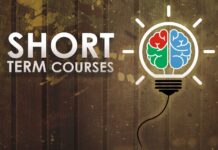Life skills are essential abilities and attributes that empower individuals to navigate the challenges and demands of everyday life. These skills encompass a broad range of competencies that contribute to personal development, effective communication, and overall well-being. By cultivating these skills, individuals can confidently face the complexities of the modern world, explore alternatives, establish productive interpersonal relationships with others, achieve personal and professional goals and make rational decisions in solving each problem or issue as it arises. In this context, Human Resource Development Center in collaboration with School of Liberal and Creative Arts (Social Sciences & Languages-Department of Psychology) Organised Short Term Course on Building Resilience, Life Skills and Therapy for Personal Well-Being w.e.f February 19, 2024 to February 24, 2024. Course aimed at enhancing the understanding connection between emotional intelligence and overall well-being, learn to identify common life skills essential for promoting well-being, utilize empathy skills to enhance communication in various interpersonal contexts, develop personalized coping plans integrating counseling insights and life skills, and designing a brief therapy session outline addressing specific personal growth goals.
Dr. Sunaina Ahuja, Professor and Dean, Head – Human Resource Development Center (HRDC), LPU the convener of the program, warmly welcomed the participants extended a warm welcome to the participants in her welcome address, she emphasized her firm belief in the course’s potential to bring about transformative change in participants’ lives. She emphasized that the course utilizes structured approaches to explore various facets of personal well-being, incorporating techniques such as resilience building, life skills development, and therapeutic interventions. Dr Ahuja emphasized that the integration of theory with practical applications will enable participants to grasp concepts and also implement them in their daily lives, thereby shaping their journey towards personal growth and well-being.
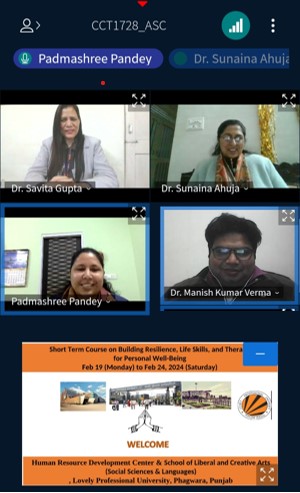
Dr. Manish Kumar Verma, Professor, Head-Department of Psychology, School of Liberal and Creative Arts (Social Sciences & Languages), LPU, co-convener of the program, then provided an overview of the course curriculum, elucidating its core objectives and significance in fostering personal growth and resilience. He highlighted the importance of structured methodologies like cognitive behavioral therapy, mindfulness practices, and interpersonal skills development in promoting mental and emotional well-being. Through experiential learning and interactive sessions, participants will gain a deeper understanding of themselves and their surroundings, empowering them to cultivate resilience and lead more fulfilling lives.
The resource panel included Dr. Sakshi Mehrotra, Counseling Psychologist, Mindlogs Psychological Services, Delhi and Ms. Padmashree Pandey, Public Health Professional & Life Skills Trainer, Delhi
Day 1-Module 1: Mastering Self-Awareness and Navigating Pressure: Your Path to Success
Ms. Padmashree Pandey, Public Health Professional & Life Skills trainer engaged the participants in a deep exploration of self-awareness, identifying their strengths, weaknesses, and areas for personal growth. Additionally, she delved into understanding the dynamics of interpersonal relationships, recognizing the significance of healthy connections in both personal and professional contexts. The module also provided insights into managing various types of pressure and equipped participants with effective strategies for navigating peer pressure while maintaining their autonomy. Furthermore, participants were guided on preparing themselves for a career in counseling, focusing on acquiring essential skills and attributes necessary for success in the field.
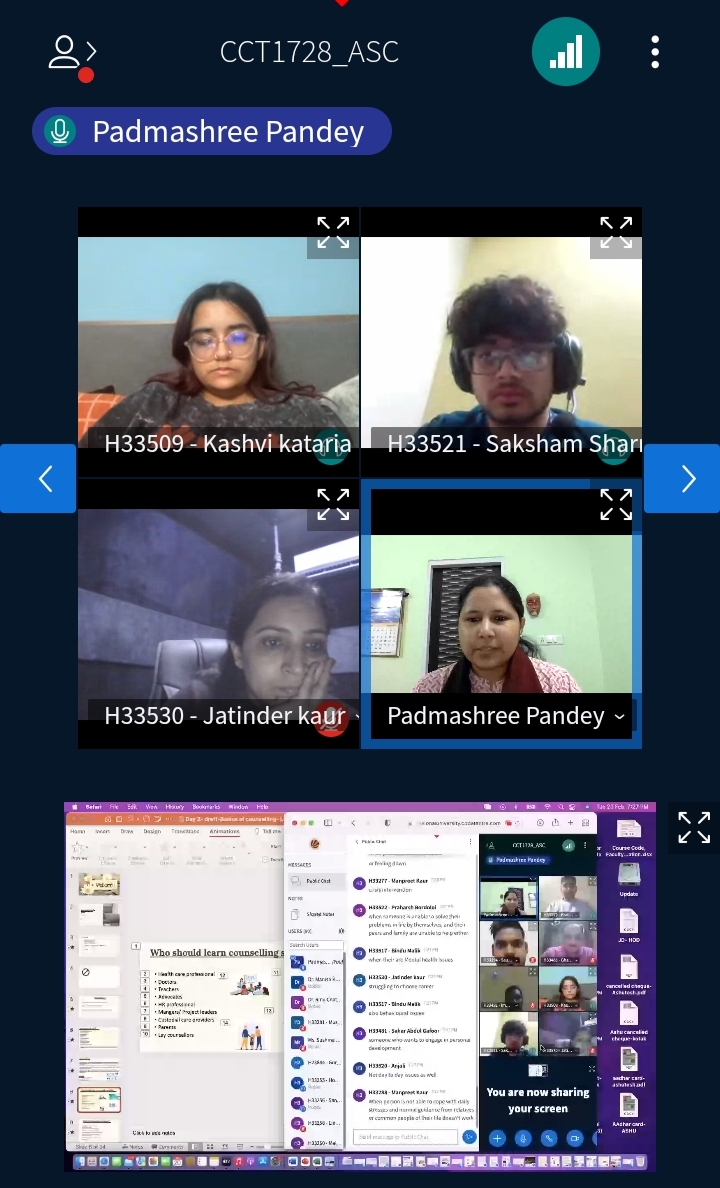
Day 2-Module 2: Counseling Essentials: Empowering Life Journey
Ms. Padmashree Pandey continued the second-day journey focusing on the fundamentals of counseling, offering participants a solid understanding of the discipline. They explored and practiced essential skills required by counselors, including empathy, active listening, and effective communication. Moreover, participants gained insights into the dynamics of the counseling relationship, learning how to establish trust and create a safe space for clients to share their experiences.
Day 3-Module 3: Harmony in Communication: Mastering Rapport and Active Listening
Dr. Sakshi Mehrotra, Counseling Psychologist, Mindlogs Psychological Services, focused on techniques for building trust and establishing rapport with clients, emphasizing the importance of a supportive therapeutic alliance. Participants also mastered the art of active listening, a crucial skill in counseling and communication, enabling them to genuinely understand and empathize with others. Additionally, strategies for effective communication and powerful questioning were discussed to enhance participants’ ability to facilitate meaningful conversations. The module highlighted the importance of feedback and self-reflection in the counseling process, encouraging participants to continuously improve their skills
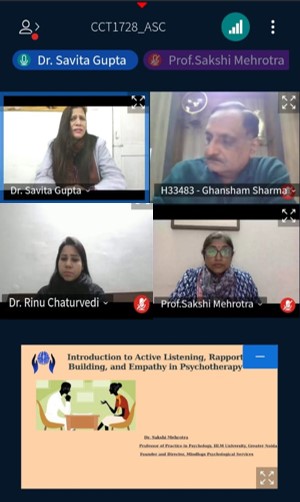
Day 4-Module 4: Emotion Mastery: Cultivating Empathy
Dr. Sakshi Mehrotra focused on the role of emotional intelligence in counseling focusing on recognizing and regulating emotions in oneself and others. Participants learned techniques for recognizing and validating clients’ emotions, fostering a supportive and empathetic therapeutic environment. Role-plays were conducted to simulate emotional situations commonly encountered in counseling, providing participants with opportunities to practice their skills in a safe and controlled setting.
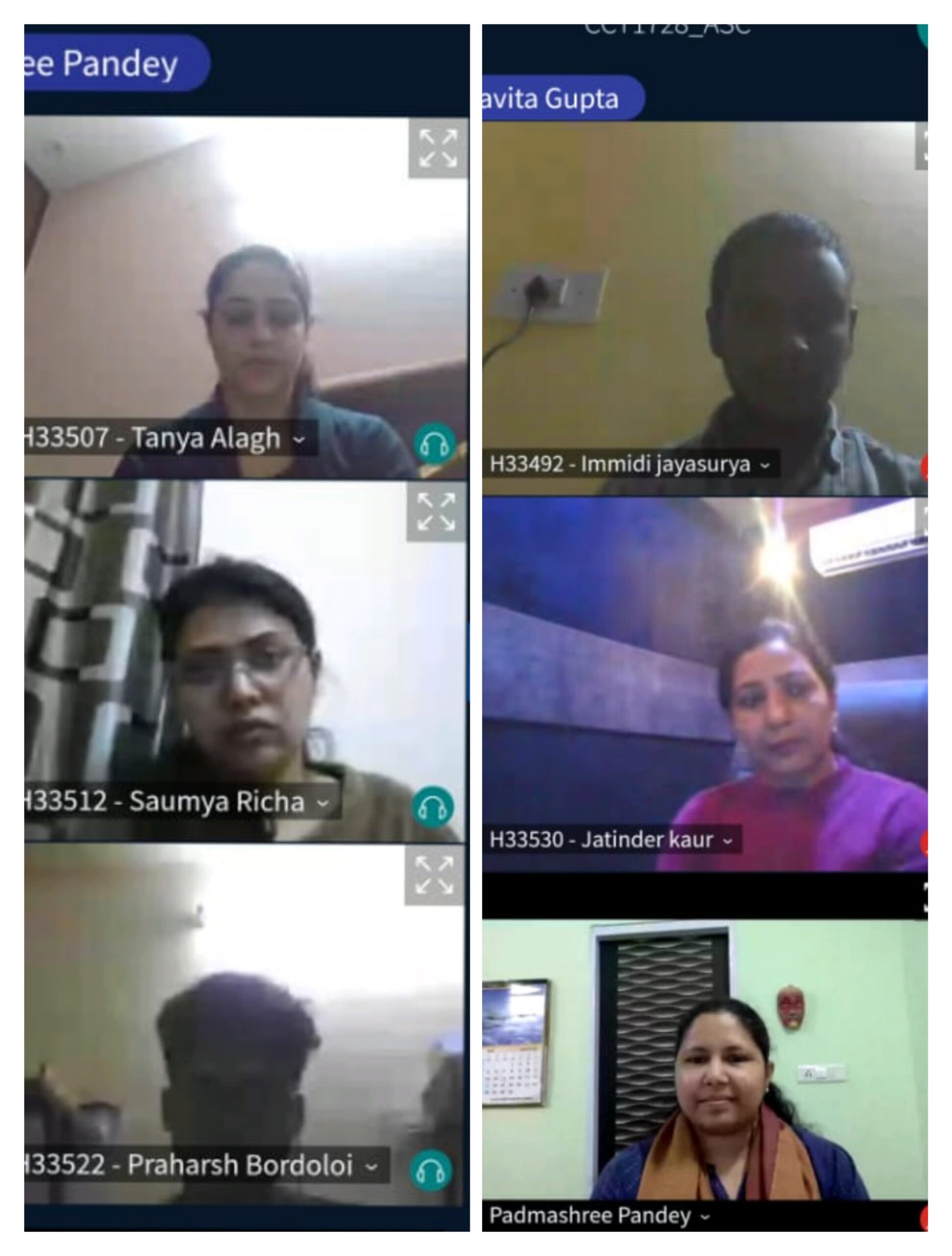
Day 5-Module 5: Strategic Achievements: Goal Setting & Action
Ms. Padmashree Pandey engaged the participants in collaborative goal-setting exercises, learning how to set realistic and achievable goals for themselves and their clients. They also discussed strategies for developing action plans and implementing them effectively to support clients in making positive changes in their lives. Furthermore, techniques for challenging and restructuring negative thought patterns were explored, empowering participants to help clients overcome obstacles and achieve their goals.
Day 6-Module 6: Mindfulness and Relaxation Techniques
Ms. Padmashree Pandey focused on the various mindfulness techniques for managing stress, anxiety, and other neurological disorders, promoting mental well-being and resilience. Participants practiced breathing exercises tailored to different conditions, providing them with practical tools for relaxation and stress relief. Additionally, case studies were analyzed and discussed, allowing participants to apply mindfulness and relaxation techniques in real-life scenarios, reinforcing their learning and skills acquisition.
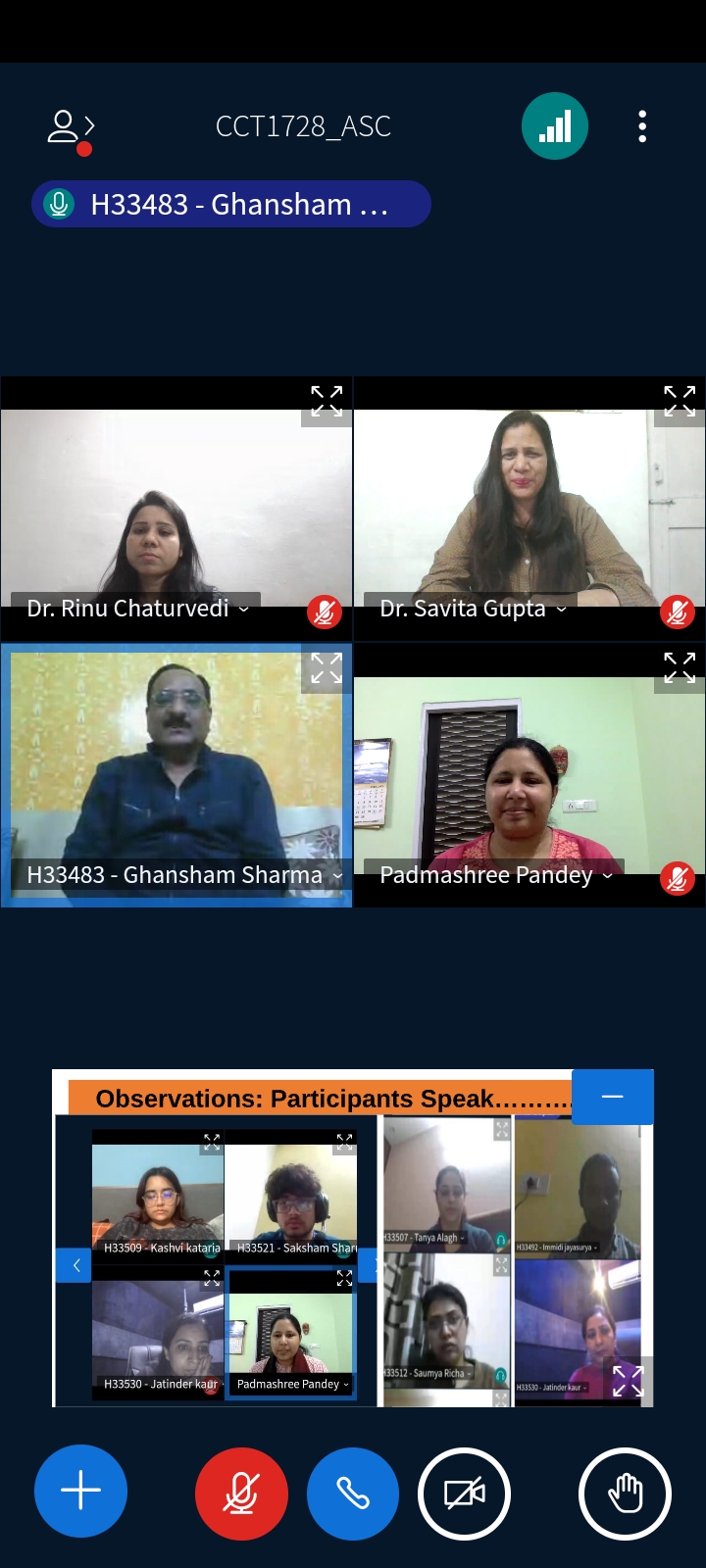
Subject Matter Experts (SMEs) strategically incorporated collaborative learning techniques, including demonstrations and case-based teaching, fostering an engaging and interactive learning environment. Post-training evaluation serves a crucial role in gauging the efficacy of the Short Term Course on Building Resilience, Life Skills and Therapy for Personal Well-Being. Employing MCQ-based and project evaluations, participants engaged in a transformative journey to prioritize their well-being and cultivate happiness. They undertook activities like maintaining a gratitude journal, practicing mindfulness, and performing acts of kindness, aiming to enhance overall well-being. Submissions, included a visually appealing PowerPoint presentation and a captivating video reel, showcasing participants’ commitment to their personal growth. Through reflection and analysis, participants gained insights into their well-being, reviving initiatives, and fostering positive behavioral changes.
Dr. Manish co-convener of the program applauded Dr. Savita Gupta, Professor, HRDC, Dr. Rinu Chaturvedi, Assistant Professor, Department of Psychology, School of Liberal and Creative Arts (Social Sciences & Languages), LPU & Ms. Sushma-HRDC, for organizing a meaningful short-term course, successful in meeting participants’ expectations. Feedback was solicited from the participants in response to which they appreciated the gesture shown by the LPU-HRDC in terms of choice of Subject Matter Experts and curriculum framed to make us clear about building resilience, life skills, and therapy for personal well-being.


